Welcome to M is for Morocco for the Global Children’s Book Club! Today we’ll be going on a virtual tour of Morocco for kids. Get ready for a fun and inspiring Morocco virtual field trip – perfect for global education at home or for a Morocco homeschooling unit.
You can find the full list of countries for the book club right HERE. Be sure to sign up for the email list to get all the information in advance and to receive fun extras!
Get your FREE Alphabet Printable Passport here!
Here’s the 2020 Global Children’s Book Club discussion schedule!
This Morocco virtual tour contains affiliate links, but all opinions are 100% my own. That means I earn a small commission if you purchase through my link, but doesn’t change your price.
M is for Morocco: Morocco Virtual Tour for Kids
Table of Contents
Featured Morocco Book
The Storyteller by Evan Turk (Author, Illustrator)
Author Read Aloud

Moroccan Storyteller Read Aloud
In addition to providing his own read aloud of The Storyteller, author/illustrator Evan Turk very kindly offered to reach out to a Moroccan storyteller friend of his. Mehdi graciously agreed to share this recording with us. Big thanks to both of them!

The Storyteller Picture Book Discussion Questions
- What is the purpose of storytelling?
- What makes a good story?
- The process of storytelling is important in the book. Does speaking a story aloud have a special significance? How does that help preserve the meaning behind it, while also allowing for new meaning to enter in?
- Can you tell a story without an audience?
- What were some of the foods that came up in the book?
- Have you ever heard a story from an older relative? How did the story impact how you view your family’s culture? Who are other storytellers in your life?
- What were some similarities and differences between the storytellers in the two tales?
- One tale was by a storyteller, and one tale had a story within a story. What is the purpose of this?
- There were a few verbal signposts in the book. What were some of them? (Again and again – repetition)
- What stories would you share with future generations from your own life and childhood?

Other Morocco Books for Kids
Morocco Facts
- The capital of Morocco is Rabat.
- The official name of the country is the Kingdom of Morocco.
- The current Prime Minister of Morocco is Saad-Eddine El Othmani.
- Morocco is located on the northwestern coast of Africa.
- Morocco borders 2 countries (Algeria and Spain because of the enclaves of Ceuta and Melilla), along with the self-governing region of Western Sahara.
- Morocco has two official languages: Standard Arabic and Tamazight. The main dialect spoken is Moroccan Arabic (known as Darija). French is the second language for 1/3 of the country, and is considered fairly prestigious in the country.
- The currency in Morocco is the dirham. $1 USD ~ 10 Moroccan dirham.
- Much of Morocco has a moderate, Mediterranean climate, with hot summers and cool and moist winters. The Sahara desert covers part of the country, which is much more dry and is hot during the day and cold at night.
- Morocco is about 99% Muslim, with about 93% being considered religious. About 2/3 of those people are Sunni Muslims.
- The primary industries include mining, leather & textiles, and tourism.
- Morocco is about the size of California.
- The country produces 2/3 of the world’s phosphates, which are used in plant fertilizers.
- Morocco was the first country to recognize an independent United States of America.
- Morocco has about the same number of cell phones as it does people.
- The oldest university in the world, University of al-Qarawinyyin, is located in Fez, and was founded in 859 C.E.
- Moroccans have three New Years celebrations.
Here’s a fun Morocco Learning Video we put together after our visit to the country!
Color in Morocco on this map of Africa!

Morocco for Kids: Flag Activity
Flag from HERE
HERE is a fun printable Morocco flag coloring sheet!
Morocco Virtual Tour to a Featured Landmark
Marrakech Medina
There are few places more active and vibrant than the main medina market in Marrakech. It is filled with stalls selling everything from pottery to rugs to spices. Jemaa el-Fnaa is the main square in the medina.
Chefchaouen
Chefchaouen is located in the Atlas Mountains and is known as the Blue City. The entire city is covered in blue, and this small city is beautiful and welcoming!
Sahara Desert
The Sahara Desert is the largest hot desert in the world. It covers much of Northern Africa, including parts of Morocco. Some parts that are closer to the Mediterranean Sea receive between 4-10″ of rain. Other areas receive much less, and only in wintertime.

Featured Morocco Artist: Mehdi Nassouli
Mehdi Nassouli grew up in Taroudant, Morocco. He is of Berber origin, and grew up with many traditional Gnawa influences. (Gnawa is a type of Islamic religious music and poetry important in Morocco and other parts of North Africa. The name stems from the Gnawa people, who are black people who were enslaved and brought to the very northern parts of North Africa by the Berber people.)
Mehdi is known for playing the traditional Gnawa instrument, the guembri (sintir). He studied many different musical traditions from North Africa and also from around the world, and has fused them to create his own sound.

Featured Important Moroccan Person: King Hassan II
King Hassan II was the king of Morocco from 1961 until 1999. Many knew him as being very dictatorial. The first 20 or so years of his rule are called the Years of Lead. This is because the government was violent against activists and protestors and those who advocated for democracy. He came from a dynasty of rulers, and was known as one of the most severe.
Featured Moroccan Food: Moroccan Recipes for Kids
- There’s hardly any food more typically Moroccan than a tagine. A tagine is both the vegetable and/or meat stew-like food that Moroccans commonly eat, as well as the ceramic dish in Moroccans cook the food. Here’s a great recipe for vegetable tagine!
- Moroccans often serve tagine with couscous. Here’s a full recipe for Moroccan couscous with vegetables.
- If tagine is the most common food, Moroccan mint tea has to be the national drink. You can make it yourself at home!
Moroccan Craft & Culture Activities for Kids
Hand-Painted Moroccan Tile Craft
Morocco has tons of beautiful hand-painted tilework, which is focused on Islamic patterns. You can create your own Moroccan tile designs at home using inspiration from Moroccan tile. Before you start, you can read a bit about Islamic art here. Pay attention to the meaning behind certain things – circular patterns, for instance, signify that God (Allah) is infinite. Geometric patterns are important, and art is essential in everyday life.
Here are a few Islamic art coloring pages to help inspiration flow!
World of Islam Tiles Coloring Pages 1, 2, 3, 4, 5
Materials Needed:
- White air-dry modeling clay
- Rolling pin (I like these mini silicone rolling pins for kids’ craft projects)
- Washable paint + brushes
- Ruler
- Knife or dough scraper
- I love these smocks to protect clothing!
- Take 4 balls of clay, each about 2-3″ in diameter.
- Flatten the dough balls and roll them out until each forms a square about 4″x4″. Try to maintain an even thickness throughout. Use the knife or dough scraper to create even squares.
- Take a look at this selection of patterns in Islamic art and pick a design, or just use them for inspiration to create your own design. Paint your four clay “tiles” with your chosen design, being careful to match up corners and edges.
- Let dry and display!
Here’s a video on geometry in Islamic art if you want to dig a little deeper!

Become a Storyteller
We heard two wonderful tales from storytellers. You can be a storyteller, too!
Think of something that has happened in your life. It could be a game you played with your family, a craft you made, a trip you took, a playdate, or any number of things. It can be something important or an everyday occurrence. Practice telling someone about the following:
- Who: who was there?
- What: what is the important thing that took place?
- Where: what are some descriptors of the location? How can you help your audience feel like they are immersed in your story?
- When: when did this happen? How long did it take? How does it relate to other events?
- Why: what is the purpose and significance of this event?
Decide if you’d like to be a verbal storyteller or a written one. Do you want to add in illustrations? Voices? Body language?
Morocco Art Books
Other Morocco Kids Activities


Animals in Morocco
The argan tree is endemic to Morocco. It is famous because you can use it to create a special oil for skin, hair, and even food. The tree’s fruit attracts climbing goats! They then eat the fruit and poop out nuts, which are then cracked open to make argan oil. You can learn more about the goats here!

Morocco Movement Activities
Like many countries, the most popular sport in Morocco is football (soccer). There are also many forms of traditional music and dance that are important in Moroccan culture!
Traditional Moroccan Folk Dance

Gnawa Music & Dance

Kid Movies About Morocco
People have filmed plenty of movies in Morocco, especially in the enclave of Ait Ben Haddou, but not that are great for kids. Please let me know if you find any!
Plan a Trip to Morocco with Kids!
After having all this fun, consider planning a virtual or real trip. What sites or cities would you visit? What food would you eat? Here’s a list of 7 reasons to visit Morocco with kids, as well as the ultimate guide to visiting Morocco with kids.
Morocco Conversations with a Local: Culture, History, & Food Discussion Video
Morocco for Kids Discussion Questions
- How has the art of storytelling been helpful in your family? Have you ever listened to a story from an older relative?
- King Hassan II was not a well-loved person in Moroccan history. Should we be studying him? Why or why not?
- If you were to film a movie in Morocco, which area would you use for filming?
- What are some ways we can keep traditional song and dance alive and relevant in our communities?
- Why are patterns so important in Islamic art?
Thanks for Taking a Virtual Visit to Morocco With Us!
We’ve loved putting together this resource to virtually visit Morocco. We’d love to hear if you do any of these activities for a homeschooling Morocco unit, or if you visit in person!
We hope to inspire curiosity and connection through exploring and learning, and we hope this guide helps you and your families. Please share any activities you do with us over on our Instagram. And we’d be delighted if you passed this Morocco for kids virtual tour and homeschooling resource along to others, as well!
MORE POSTS
IF YOU LIKED THIS POST ABOUT MOROCCO FOR KIDS, YOU MIGHT LIKE THESE POSTS TOO:
- GCBC Virtual Travel Guides
- 10 Tips for Traveling to Morocco with Kids
- 10-Day Morocco Itinerary: Morocco Highlights Tour with Kids
NOT READY FOR A MOROCCO HOMESCHOOLING UNIT QUITE YET? PIN THIS POST FOR LATER!
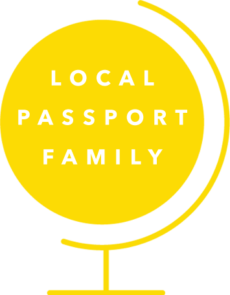
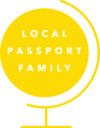
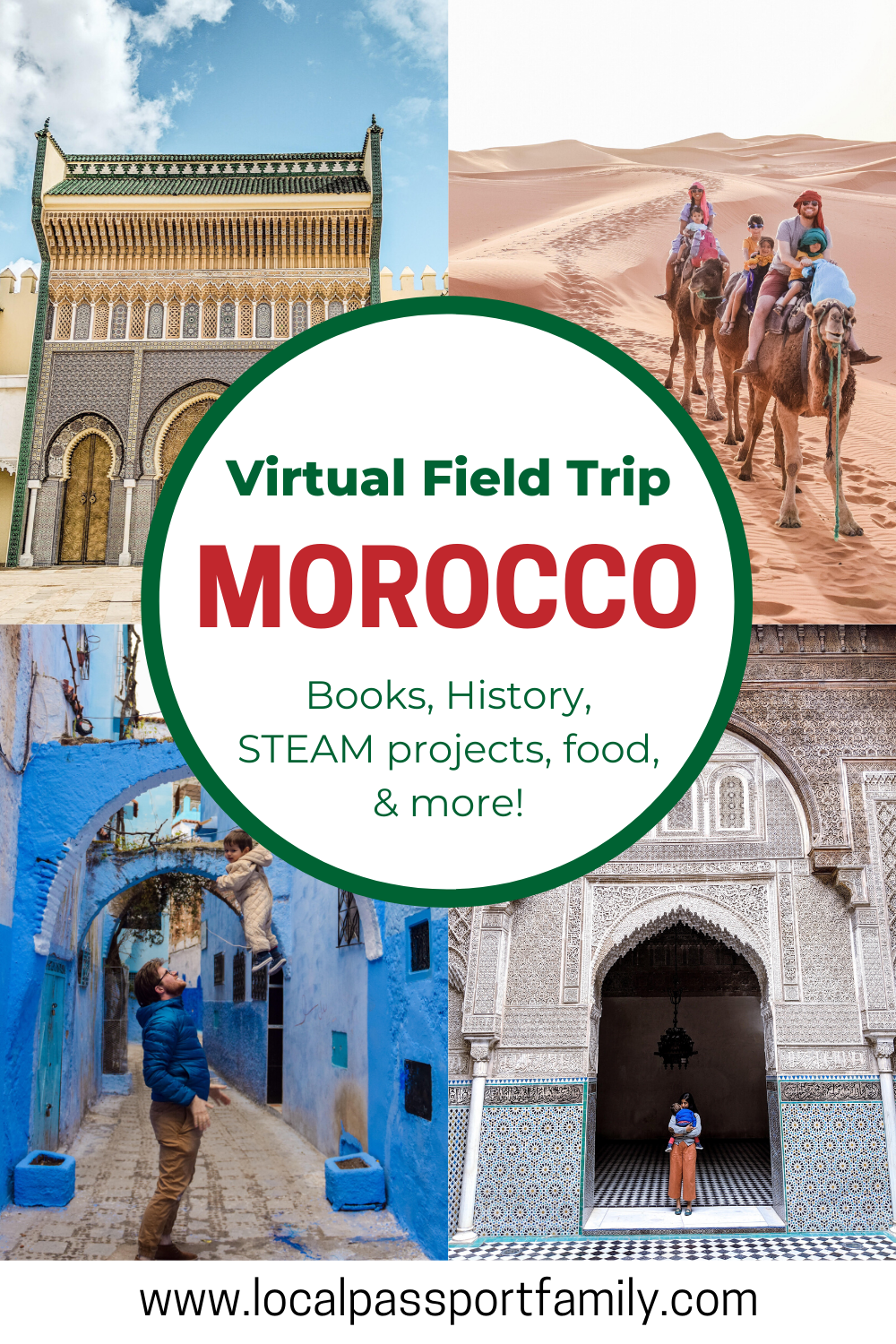

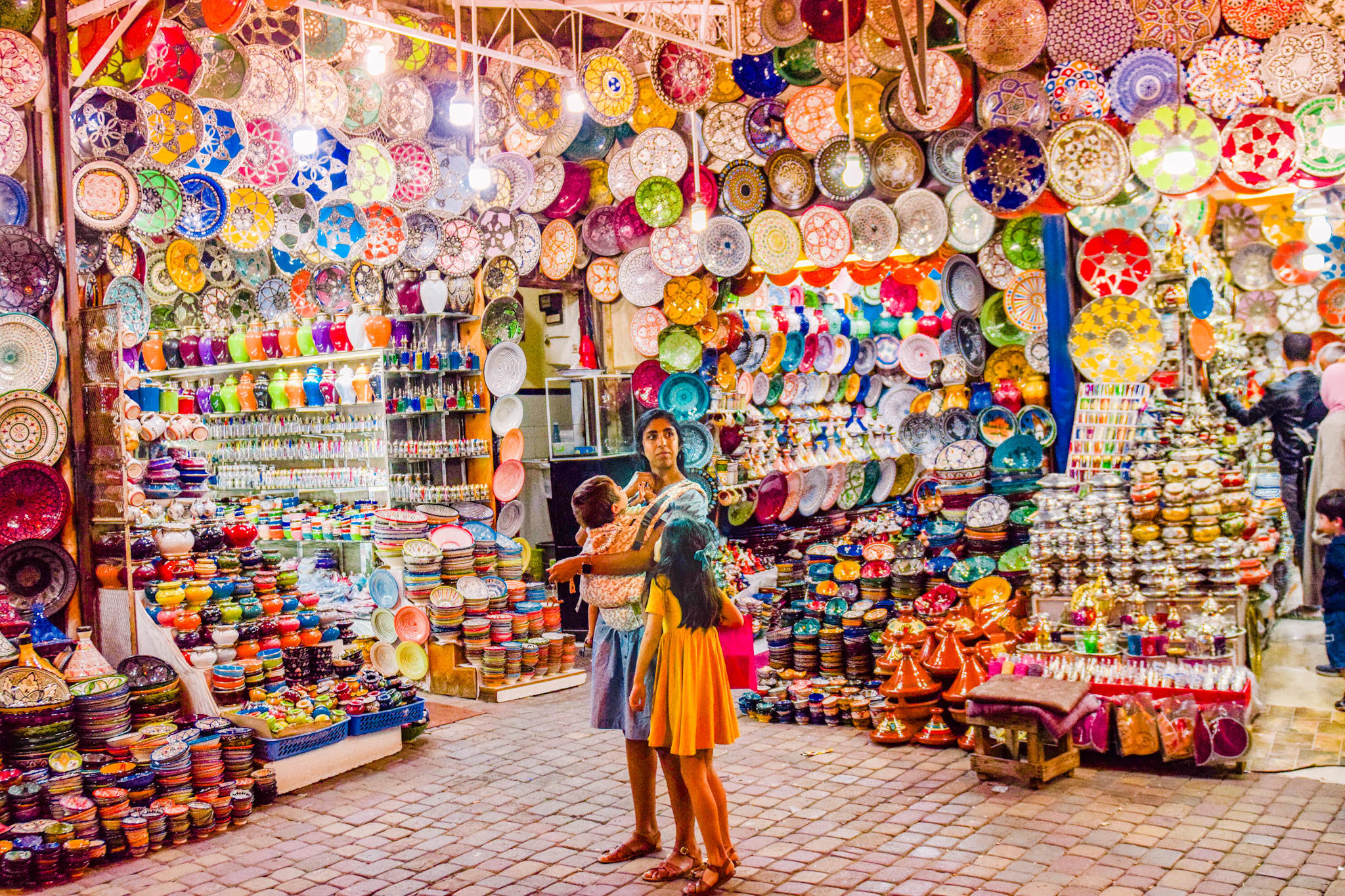
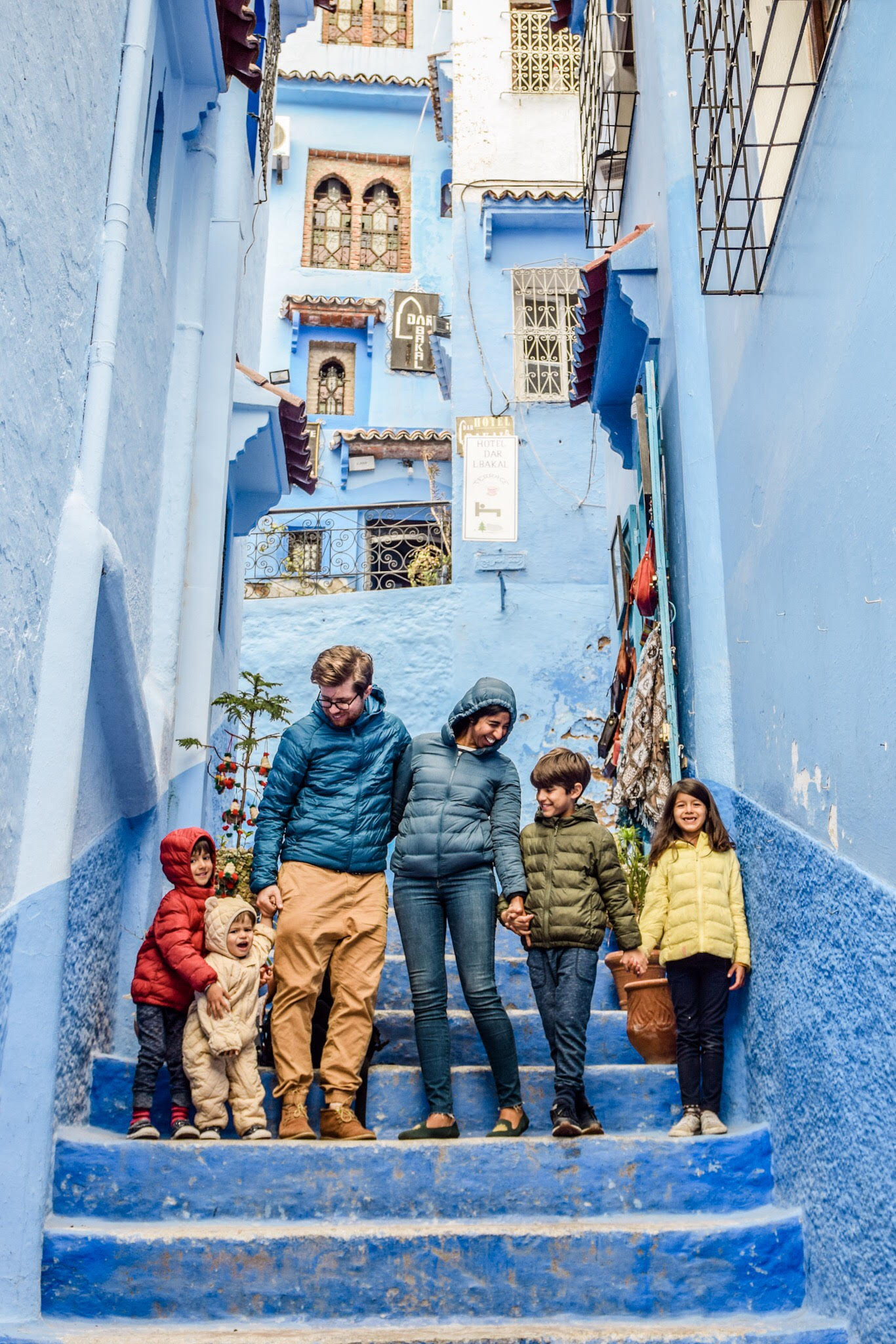
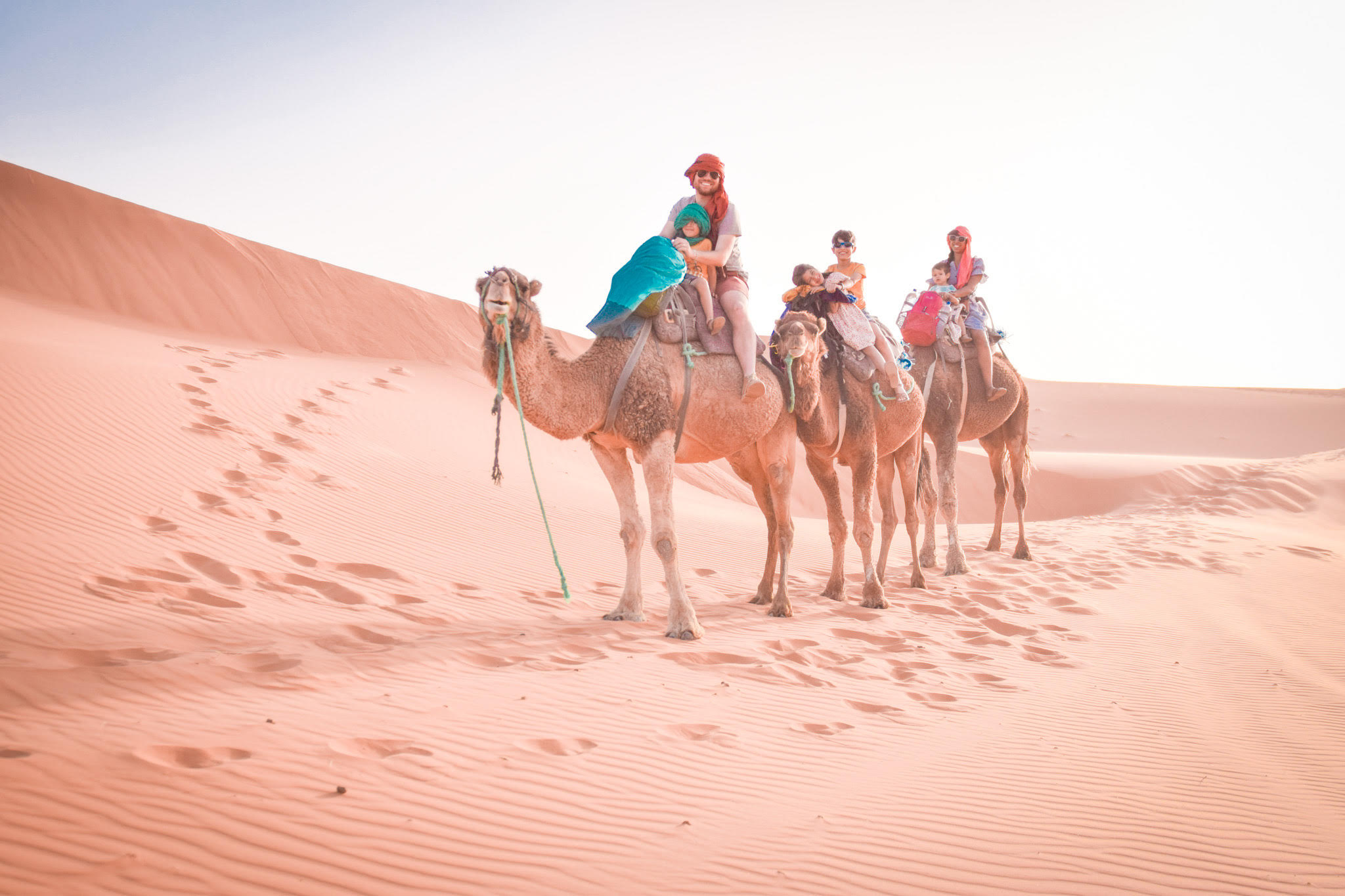

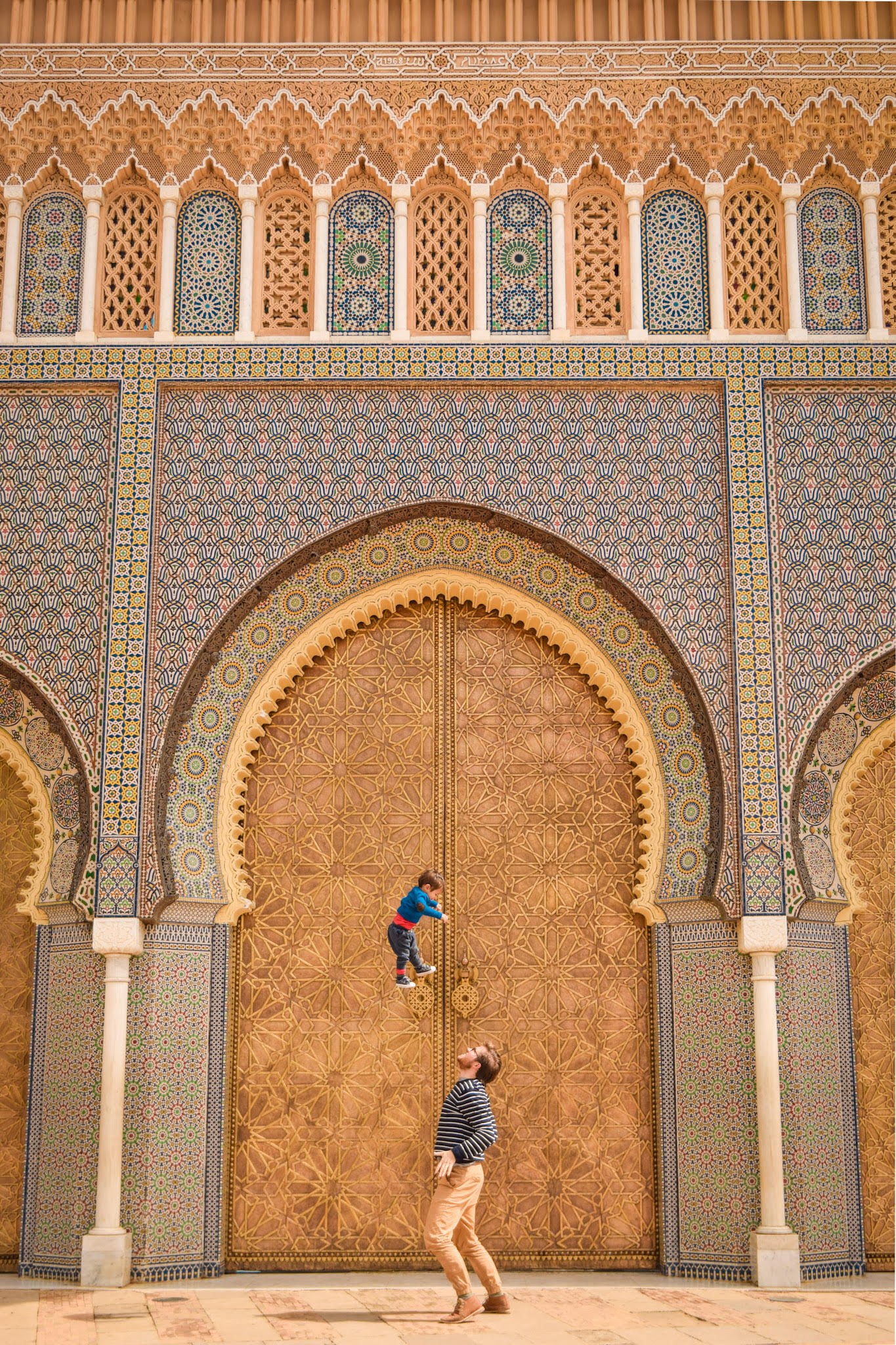
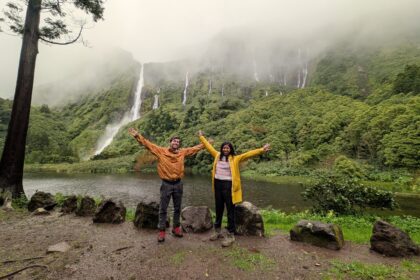
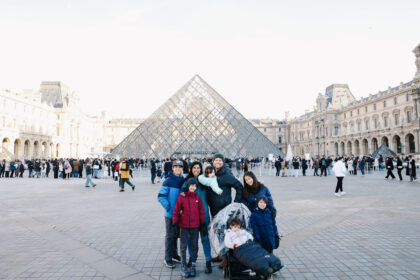
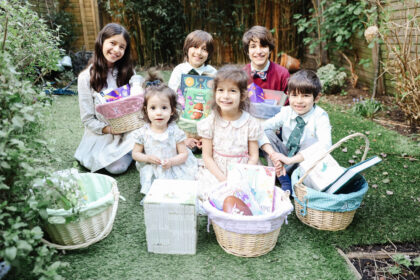
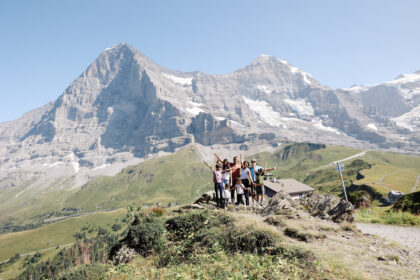
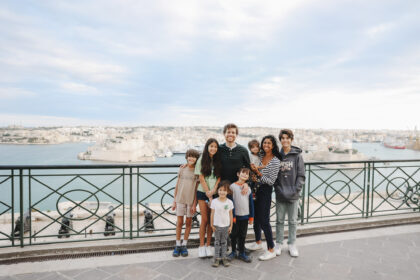
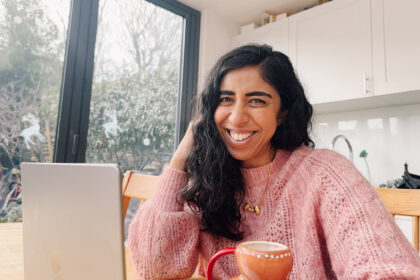
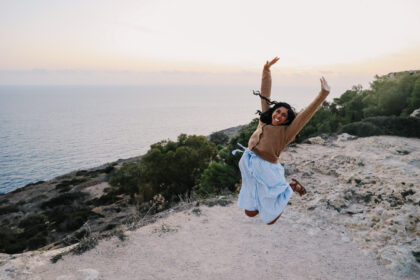
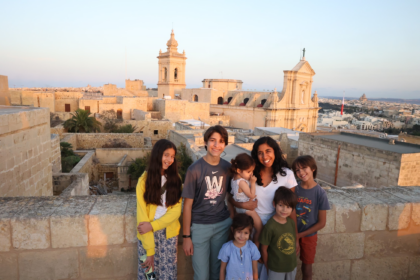

[…] 14th: Nigeria December 15th: Morocco December 16th: Kenya December 17th: Zimbabwe December 18th: […]
[…] Find a picture book read aloud and discussion of The Storyteller and also an indigenous storyteller right here! […]
[…] M is for Morocco […]
[…] Morocco and here as well […]